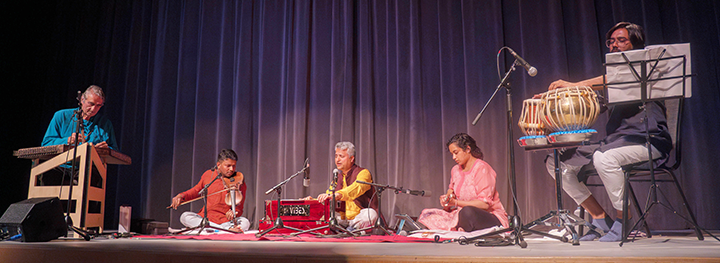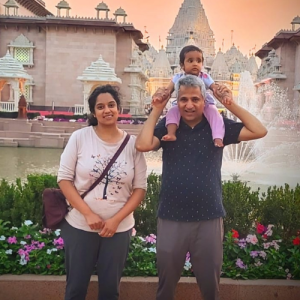The musical life of MSVU’s Dr. Ashwani Kumar
Music has always been an integral part of Dr. Ashwani Kumar’s life, yet he likely could never have anticipated how it would set the tone for everything from his teaching and research to his marriage and parenting.
“I grew up in India and I love music, as a majority of the people love it there, because music is everywhere. No matter where you go, you will hear music. You go to a barber shop, music is playing. You are just sitting in the house – you will hear music coming from somewhere. Same in the busses. Music is everywhere in India, and people embrace it,” says Ashwani, a professor in MSVU’s Faculty of Education.
Eager to learn
Such was Ashwani’s love for music that he wanted nothing more than to learn to sing and play the harmonium, but that had to wait until later in his life.
“My family did not have the financial means to support musical learning,” he says. “I was told early on in my childhood that I cannot learn music – that it was not something for me. But I continued preserving it within myself thinking at some point I will learn when I have the time and opportunity.”
Sometimes the things we’re told we can’t do become irresistible to us, and it was that way for Ashwani and his deep desire to learn to sing and play the harmonium. But it wasn’t until Ashwani joined MSVU in 2011 that he began his search for a music teacher. Eventually he found the right match – both in his instructor and with the fellow student who ultimately became his wife.
“My fellow student Nayha Acharya, who is now my wife, was my teacher in many ways in the beginning,” says Ashwani, who first started learning to sing in a group class offered at a Hindu temple in Halifax. “We learned from Mr. Vijay Vyas, and the class was an amazing experience for me.” Later, we also began learning from my uncle in India, Mr. M.C. Gotan, who is a wonderful and accomplished harmonium and violin player and an amazing composer.

Inspired to share
Ashwani says that, as he learned, he came to realize how personally meaningful Indian classical music is for him, and he was inspired to both expand and share his knowledge.
“Music became a form of meditative inquiry for me,” he says. “The more I took interest in it, the more my desire to learn it grew, and then I started thinking that I would like to teach it. I started offering classes to children and adults at my home with my wife accompanying me. I also recently taught a course on the music of India at the Mount, and the students just loved it.”
Ashwani says the course was meaningful to students from both India and Canada, with everyone enjoying the culture and atmosphere while learning both the history of the music and how to sing it.
“The joyful, peaceful, and meditative nature of raag music of India is a draw not just for me, but for a lot of other people too,” he says.
Teaching as meditative inquiry
Ashwani, who teaches at both the undergraduate and graduate levels in MSVU’s Faculty of Education, has created a number of courses since coming to the university. He leads classes focusing on holistic teaching and learning and is in the process of developing a course called Music and Culture of India for graduate Education students. He is also introducing his students to new ways of teaching.
“I have developed a new approach to teaching called teaching as meditative inquiry which has been very well received by my students and has also received recognition from the wider community,” says Ashwani. “I have tried to infuse that approach through all of my courses and students have responded very well to it. It centers them and their exploration of themselves in relation to what they’re studying, which they really appreciate.”
Intertwining teaching and research
Ashwani says his teaching and the research he is engaging in during his current sabbatical are closely connected.
“I’m exploring the diverse ways in which teaching and learning can take place, not limited by mainstream perspectives, but rather ways informed by more diverse and global perspectives that are rooted in culture and tradition,” he says. “It occurred to me that it would be so interesting to do a bit more investigation into the field of Indian classical music as not only an art form, but also as an education system.”
His sabbatical research also includes performing Indian classical music at various venues in Halifax, including the Canadian Museum of Immigration and local Indian associations, as well as studying the associated pedagogical system and writing and presenting about it.
“Recently we organized a very unique event at MSVU where I invited local musicians in Halifax who practice Indian classical music,” he says. “The focus was on showcasing Indian classical music played by those who are working hard at learning the craft and preserving it. The performance part of that event was followed by a brief talk and panel discussion. In my talk, I briefly described the pedagogical dimensions of Indian classical music, and in the panel discussion with the performers we explored their journeys with Indian classical music.”
Creating family connections
 Music not only brought Ashwani together with his wife – a Dalhousie University law professor with whom he first learned to sing and now teaches Indian classical music – it has also been central to the life of their young daughter, Kalyani, from the very start.
Music not only brought Ashwani together with his wife – a Dalhousie University law professor with whom he first learned to sing and now teaches Indian classical music – it has also been central to the life of their young daughter, Kalyani, from the very start.
“From the very moment she was conceived, she has been immersed in music,” he says. “Even a child, if exposed to music, feels very drawn to that music, without necessarily any pressure or any expectation. So, I’m sure she’s finding some joy and peace in it, too.”